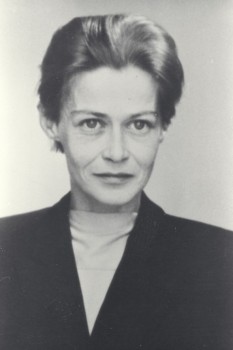Search results for "2011/04/2010/05/song-without-words"
Life: facts and fiction
10 September 2014 | Extracts, Non-fiction
 In his latest book, the architect and author Arne Nevanlinna (born 1925) recalls, among other things, his Helsinki childhood and family, the wartime period, his fellow architect Alvar Aalto, various aspects of the spirit of the times, his own work and writings. His first novel Marie was published in 2008. Extracts from Arne. Oman elämän kintereillä (‘Arne. On the trail of one’s life’, Siltala, 2014)
In his latest book, the architect and author Arne Nevanlinna (born 1925) recalls, among other things, his Helsinki childhood and family, the wartime period, his fellow architect Alvar Aalto, various aspects of the spirit of the times, his own work and writings. His first novel Marie was published in 2008. Extracts from Arne. Oman elämän kintereillä (‘Arne. On the trail of one’s life’, Siltala, 2014)
My attitude to my own identity has developed from the unconsciousness of childhood, the uncertainty of early adulthood, the artificial arrogance of middle age and the self-analysis of approaching retirement, to my present situation.
Despite the fact that my first book had some degree of success, it took many books before I felt I was a real writer. The process continued for well over ten years, by which time I was already over eighty. Before that, I thought of writing as a way to pass the time and combat loneliness. I imagined that I was writing for a living, and that I lived in order to write. I was in the fortunate position of not to think about my income.
Even then, I knew that this was just a catchphrase for the event that it occurred to someone in the audience to ask me why I wrote. That never actually happened. No wonder, as both question and answer would have been unnecessary, to put it mildly, and stupid, to put it harshly. More…
The love of the Berber lion
30 December 2008 | Fiction, Prose
A short story from the novel Berberileijonan rakkaus ja muita tarinoita (‘The love of the Berber lion and other stories’, WSOY, 2008). Introduction by Janna Kantola
The lion’s name was Muthul. He was an old Berber lion from the Atlas Mountains. He had a black mane, a black tail with a bushy tip and the scars of many battles on his hide.
He had grown up as a lion cub in the royal palace at Carthage at the time when the Romans, led by Scipio the younger, destroyed the city with fire and sword. The palace was set ablaze, a bloody battle ensued in the gardens, Romans impaled on arrows lay strewn in the rose bushes, Carthaginian blood dyed the water in the fountains. Someone had let all the palace animals, wild and tame alike, out of their cages; they were running around wildly, killing each other in the grip of panic, then disappeared inexplicably. More…
A Note on Nine Contemporary Poems from Finland
31 March 1987 | Archives online, Articles, Fiction, Non-fiction, poetry
Contemporary Finnish poetry, translated and introduced by Anselm Hollo
The last couple of months, it has been my pleasure to browse around in a tightly packed shelf of books of poetry published in Finland in the last five years. On the showing of these, and of the excellent anthology Modern finlandssvensk lyrik (‘Modern Finland-Swedish poetry’, 1980), edited by Claes Andersson and Bo Carpelan, poetry certainly seems to be alive and well in the old homeland. In a way, the sheaf translated here is just first travel notes, individual works that struck my fancy seemed translatable: thus, by no means a ‘representative selection’.
Claes Andersson’s poem ‘When I was born, Helsinki was…’ was quite simply a direct hit (perhaps an unfortunate metaphor in that it deals, in part, with the WW2 air raids on Helsinki) – it brought back personal memories from my early childhood. But beyond those immediate circumstances, it is also a very moving evocation of the magnificent and terrifying world of magic children inhabit. Helena Anhava’s ‘These years…’, with its marvelous image of the great hinge turning in the human psyche at certain points familiar to anyone who has lived into middle age, seemed a fine example of her impressive body of meditative lyric poems, sharing a tenor of wistfulness not uncommon in Finland’s poetry with Bo Carpelan’s ‘You drive up…’, which is also a poem of the pangs of change. In Carpelan’s text, the clash between ‘wonderful clear Vivaldi’ on the protagonist’s car radio and the perceived tawdriness of the environment is beautifully balanced between genuine revulsion for the latter and a self-irony directed against the self-declared ‘finer sensibilities’ of the class that can afford them. Tua Forsström‘s ‘Do you want to hear something’ moves in a lovely dance figure from myth to everyday present: we see the interior world that is Nausicaa’s island shimmering through the exterior in which ‘someone’s/ balcony door whines all night like a cat’. More…
Coming up next week…
7 May 2010 | This 'n' that
‘…A strange tapir / (the bi-coloured one) / a wondrous tapir (the many-toed one) / circles the tree, goes round and about, / a small word hangs from the tip of his snout….’
Helvi Juvonen (1919–1959) wrote nature-inspired poetry; she was a fan of the 19th-century American poet Emily Dickinson, whose work she also translated. Her short adult life, in the drab Helsinki of the post-war years, was burdened by poverty and illness, and yet she wished to ‘toast the richness of our lives’.
The literary scholar Emily Jeremiah has translated a handful of Juvonen’s poems and takes a look at her work in this, the 15th part of a series devoted to classic Finnish authors (also available in our archive are essays about Kirsi Kunnas, Henry Parland and Sirkka Turkka). Helvi Juvonen: small words celebrate ‘the richness of our lives’
Pomp and circumstance
31 October 2013 | Fiction, Prose
Extracts from the novel Bär den som en krona (‘Wear it like a crown’, Schildts & Söderströms, 2013). Sanna Tahvanainen interviewed by Janina Orlov
A kick in the stomach – yes, that is what it feels like each time I catch a glimpse of the Crystal Palace. The miniature on Albert’s desk has finally grown to maturity. The great greenhouse towers where once the elms stood. On a clear day the sun dances along the glass, making it glisten, the whole place all but blinding us. One is forced to squint on approaching it. One reaches out a hand, and when it touches the glass and steel, one knows one is there.
The grand opening is a mere five days hence. I step inside, he will be there somewhere. He is unaware of my arrival; it is to be a surprise. These last months he has been gone long before I have woken, and arrives home only once I am asleep. He seems quite indefatigable, neither sleeps nor eats properly. These last weeks there has been nothing else on his mind but the Great Exhibition. More…
Canberra, can you hear me?
31 March 1987 | Archives online, Fiction, Prose

Johan Bargum. Photo: Irmeli Jung
A short story from Husdjur (‘Pets’, 1986)
Lena called again Sunday morning. I had just gotten up and was annoyed that as usual Hannele hadn’t gone home but was still lying in my bed snoring like a pig. The connection was good, but there was a curious little echo, as if I could hear not only Lena’s voice but also my own in the receiver.
The first thing she said was, ‘How is Hamlet doing?’
She’d started speaking in that affected way even before they’d moved, as if to show us that she’d seen completely through us.
‘Fine,’ I said. ‘How are you?’
‘What is he doing?’
‘Nothing special.’
‘Oh.’
Then she was quiet. She didn’t say anything for a long while.
‘Lena? Hello? Are you there?’
No answer. Suddenly I couldn’t stand it any longer. More…
Portraits and bagatelles
30 September 2008 | Fiction, Prose

Kaarina Valoaalto. Photo: Tammi.
Soila Lehtonen on Kaarina Valoaalto’s new collection of short prose
In Kaarina Valoaalto’s prose ‘the river, made wild by a storm, gallops, foaming at the mouth, down between the stays of the street banks and into the sea’ and ‘the fly is a classic’: ‘its buzz sounds the cycle of the year and all of the scales of feeling. A fly brings together agrarian and urban culture…. When I hear it, I believe I’m alone in the cabin of a sailboat, anchored to the bottom of a bay where terns and seagulls call out on the gleaming blue of the open sea and no there is no coffee because no one has bothered to make it’. More…
What does the neighbour think?
26 April 2013 | Essays, Non-fiction
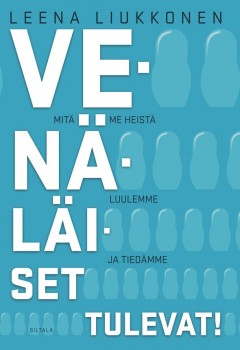 For more than 20 years journalist Leena Liukkonen has been thoroughly involved with Russian culture, commerce, language and psyche. The subtitle of her new book of essays Venäläiset tulevat! (‘The Russians are coming!’) is ‘What we think and know about them’, and refers to the fact that the Finns do not really know their eastern neighbours very well. Liukkonen writes with insight about the differences in history, mentality and world view
For more than 20 years journalist Leena Liukkonen has been thoroughly involved with Russian culture, commerce, language and psyche. The subtitle of her new book of essays Venäläiset tulevat! (‘The Russians are coming!’) is ‘What we think and know about them’, and refers to the fact that the Finns do not really know their eastern neighbours very well. Liukkonen writes with insight about the differences in history, mentality and world view
Extracts (under original subtitles) from Venäläiset tulevat! Mitä me heistä luulemme ja tiedämme (Siltala, 2013)
WAR, REMEMBERING AND FORGETTING
In café conversations with other visitors to Russia, we often react with exasperation to the fact that discussions in Finland only ever start with the Winter War. Sometimes we wonder why the threshold between us and our neighbour to the east is still so high. My own living contact with the past, however, makes it clear to me that everything the elderly carry round with them could not have been simply shaken off with the passage of time. Nor can the next generation just break away from it. My own experience also reminds me how distant our eastern neighbour was during peacetime. After all, a very few have made the long journey to the country next door. To many people, the old story was the only story there was about Russia. More…
The fox and the bear
30 December 2008 | Children's books, Fiction
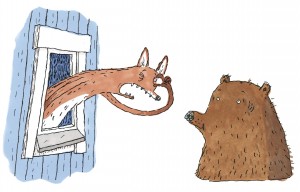
A story from the children’s book Sorsa norsun räätälinä (‘The mallard as tailor to the elephant’, Otava, 2008; illustrated by Christel Rönns. Introduction by Päivi Heikkilä-Halttunen
Back in the days when mallard still had horns, earthworms, claws, and the bear had a long tail, a bear was trudging dejectedly along the road.
Up drove a fox in his van, studded tires crunching, for it was winter and freezing cold. The fox was coming from fishing and his van was bursting with fresh fish. When he saw the bear, the fox stopped, rolled down the window and called, ‘Why hi there, old honey snout! Where’re you coming from?’
‘I was playing cards at Badger’s. I lost all my money and now I’m starving,’ the bear replied.
‘Jump in. No need to suffer in the grip of this cold,’ the fox said. The fox and the bear were good friends. However, the fox envied the bear, because Mr Honeypaws had a much longer, more handsome tail than the fox did. The bear clambered into the fox’s car and saw the enormous catch of fish.
‘Wherever did you get such an incredible amount of fish?’ the bear marvelled.
‘The lake. That’s where you get fish,’ the fox replied. ‘Last week I caught such a big pike that I made snow shovels out of its scales.’ More…
3 x Runeberg: poet, cake & prize
5 February 2014 | This 'n' that
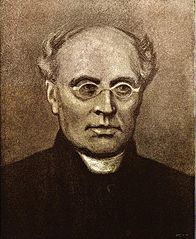
J.L. Runeberg. Painting by Albert Edelfelt, 1893. WIkipedia
Today, the fifth of February, marks the birthday of the poet J.L. Runeberg (1804–1877), writer, among other things, of the words of Finnish national anthem.
Runeberg’s birthday is celebrated among the literary community by the award of the Runeberg Prize for fiction; the winner is announced in Runeberg’s house, in the town of Borgå/Porvoo.
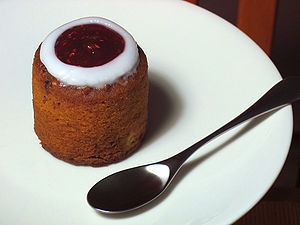
Runeberg’s favourite. Photo: Ville Koistinen
Mrs Runeberg, a mother of seven and also a writer, is said to have baked ‘Runeberg’s cakes’ for her husband, and these cakes are still sold on 5 February. Read more – and even find a recipe for them – by clicking our story Let us eat cake!
The Runeberg Prize 2014, worth €10,000, went to Hannu Raittila and his novel Terminaali (‘Terminal’, Siltala).

Hannu Raittila. Photo: Laura Malmivaara
According to the members of the prize jury – the literary scholar Rita Paqvalen, the author Sari Peltoniemi and the critic and writer Merja Leppälahti – they were unanimous in their decision; however, the winner of the 2013 Finlandia Prize for Fiction, Jokapäiväinen elämämme (‘Our everyday lives’) by Riikka Pelo, was also seriously considered.
Read more about the 2014 Runeberg shortlist In the news.
The search goes on
31 December 2007 | Archives online, Essays, On writing and not writing
The Finlandia Prize-winning author Kjell Westö recalls his literary adolescence, and the moment – of a dark January night – when he stopped worrying about writer’s block and began to write
When I was in my twenties, my urge to write was very strong. I was driven, almost consumed, by this ever-present zeal, which tore me apart nearly as inexorably and effectively as love did. But I wrote precious little. Now, some twenty years later, I have a general idea about the traps I so unknowingly walked into. More…
Hearth, home – and writing
30 December 2007 | Archives online, Extracts, Non-fiction
Extracts from Fredrika Runeberg’s Min pennas saga, (‘The story of my pen’, ca. 1869–1877). Introduction by Merete Mazzarella
The joy and happiness I experience at being able to see into [her husband] Runeberg’s soul, at living with him in his heart and his thoughts, belong far too firmly to the mysteries of my soul that I should wish to attempt to express them in words. But of the life that existed around us I should like to try and give an impression of sorts.
We moved to Borgå in 1837. I was unfamiliar with the town and knew only a little old lady, weak with age, and found myself very lonely indeed, accustomed as I was to living with relatives and a genial circle of friends. I did, however, still have my two eldest sons at home to keep me happy and occupied. More…

